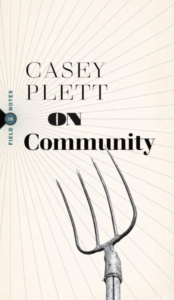by Joni Doornenbal
On Community
by Casey Plett
Biblioasis (2023)
Casey Plett’s new book-length essay On Community is a gracious contemplation of community in its many iterations, from the catty dramas of tight-knit southern Manitoba Mennonite enclaves to the vital (but often fraught!) trans lady picnics of New York City. Pinning together the work is the search for the correct definition of a word, which spirals out into places of encounter with memory, queer history, the independent publishing scene, and the process of developing the essay itself. Readers of Plett’s fiction will find the essay’s expertly crafted interiority right at home with the best parts of her acclaimed fiction–and, in particular, Little Fish’s psychic journey–and enthusiasts of creative non-fiction will find that the book’s judicious inclusion of narrative writing places On Community among the better new releases in the genre.
The essay eschews polemics, instead holding the reader as Plett reflects on and then explicates her own experiences with the titular subject. While the essay makes ample use of contemporary secondary reading like Michael Hobbes’ The Epidemic of Gay Loneliness (which makes a fabulous companion to Plett’s essay!) and Miriam Toews’ Peace Shall Destroy Many, carefully selected personal anecdotes thoroughly hammock the work and demonstrate Plett’s prowess with craft. But these transitions do not feel jarring. This is partly the result of the concision of the essay’s segments–the longest segment, “Queers”, is only nine pages long, with most lasting only a page or two. However, Plett’s flexibility as a writer holds the work together.
Writing on Michael Hobbes’ identification of a kind of trauma called “intraminority stress”, Plett writes her ‘I’ into her incisive analysis of Hobbes’ critique:
The trauma explanation began to wobble. These mental health disparities, researchers found, remained even among populations who had not survived homophobic traumas; and even among those who did, such traumas weren’t what kept coming up. An uneasy source of stress came to light: ourselves…I also can’t help but think these lessons are applicable to wider queer communities—i.e., the phrase ‘dyke drama’ doesn’t come from nowhere, and dating app bullshit and judgment and sexual racism are not exactly unprevalent in lesbian and trans worlds, and speaking of which, ask any young lesbian what she thinks of the app Lex and be prepared for a deluge. In a broader sense, this is all age-old, and personally might I say that trans community infighting in my own life seems about as inexorably aggravating as New York traffic (127).
From a rhetorical perspective, Plett’s strategy in this passage reflects the structure of the essay as a whole work–she starts with an abstraction, but she finds points of contact with the material that require a personal response. She demonstrates a deft ability to craft a rhetorical strategy informed by her own history and encounters with the various communities she engages with. Consequently, Plett can stitch abstraction into the quilt of experience that propels the essay to its destination.
Plett’s new essay is a valuable contribution during a time when community feels more indispensable than ever. While the work adopts the styles and rhetoric of memoiric creative non-fiction, its conclusions are pointedly universal, providing readers with balms for an increasingly redolent word.
Joni Christina Doornenbal is a poet and critic with roots in Calgary and Crestomere, Alberta. She holds degrees in writing from the universities of Calgary and Groningen, the Netherlands.

